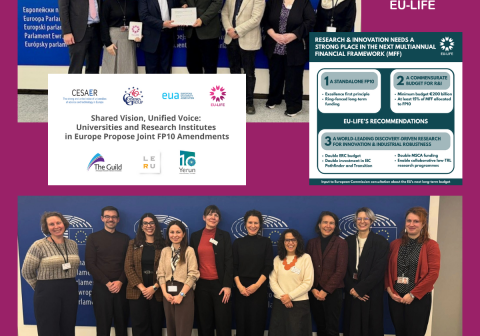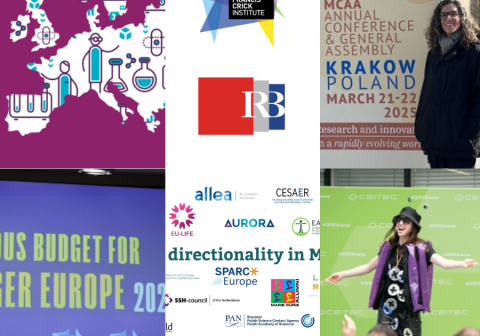Towards FP10: EU-LIFE’s vision for MSCA
Without researchers, there are no discoveries paving the way for scientific, social, economic and technologic innovation. Marie Sklodowska Curie Actions (MSCA) is a fundamental programme to attract, retain and circulate talent across Europe, support the career development of researchers from their early stages, including diverse career paths, and foster a culture of open science, responsible research and collaboration between organizations within the research ecosystem. The MSCA programme must continue to be an essential part of FP10, the next Research & Innovation programme, in order to contribute to excellence in Europe and support its researchers.
In the context of the European Commission’s consultation on Marie Sklodowska Curie Actions, we hereby outline EU-LIFE’s vision for MSCA in FP10. This is part of EU-LIFE’s contribution to the policy debate on the next Framework Programme and follows the position paper EU-LIFE’s 10 Guiding Principles for FP10 launched in January 2024. We provide a two-level vision for MSCA that is realistic yet ambitious.
Be realistic
Secure a strong MSCA keeping its current scope with commensurate budget. The scope of the programme and its key features are fit for purpose to boost research careers and they should be maintained and strengthened with a commensurate budget. For that we recommend:
- Continue MSCA’s bottom-up, excellent research approach and the promotion of mobility and interdisciplinarity throughout.
- Keep early and mid-career researchers at the core of MSCA and promote increased capacity of research organizations regarding training, supervision and mentoring of its staff.
- Enforce MSCA’s pivotal role in promoting high standard research culture across Europe, including the promotion of open science, responsible research, diversity, equity, and inclusion within the research community.
- Increase the investment on MSCA programme within FP10 budget allocation to allow for the intended impacts.
- Increase flexibility of rules and criteria to allow for the intended impacts.
- Continue pioneering innovative initiatives at the concept and implementation levels.
- Seek synergies with other schemes that support excellence and innovation.
- Reduce administrative burden for applicants and beneficiaries.
Be ambitious
Envision enriching the MSCA in and beyond its current scope with additional funding. Yet, thinking about the future, what would a more ambitious MSCA look like? How could the programme be enriched, synergized or complemented to provide wider impact? To achieve this second level, would be critical. Concrete suggestions from EU-LIFE community include, among others:
- Create an MSCA-to-ERC funding scheme to promote a continuum in research careers in Europe, with additional funds to those already allocated to MSCA.
- Create an MSCA Proof of Concept scheme to promote innovation pathways and inspire an innovative mind set for researchers, with additional funds to those already allocated to MSCA.
- Create a collaboration platform for active MSCA projects to boost collaboration among MSCA fellows and joint training efforts for hosting institutions.
- Create a match-making platform to identify opportunities for excellent yet unfunded MSCA proposals and private funders.
- Apply country correction coefficients (CCCs) broadly; and explore and test a more granular model of CCCs at region or city level.
- Promote global talent attraction by creating joint mobility schemes with other regions of the world, with additional funds to those already allocated to MSCA.
EU-LIFE’s vision for MSCA is based on an internal consultation to the EU-LIFE member institutes from 15 countries across Europe. The EU-LIFE community provided over 50 recommendations and proposals on overarching topics such as Novelties, Flexibility and Modifications (11 ideas); Funding (10 ideas for EU and national, in and beyond MSCA programme); Capacity building, Recognition and Networking (9) and Administrative burden (8).
Read the full statement here.



